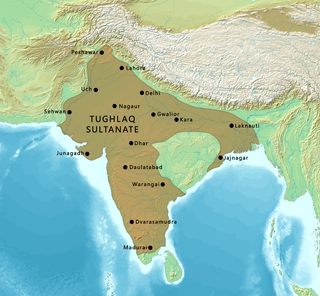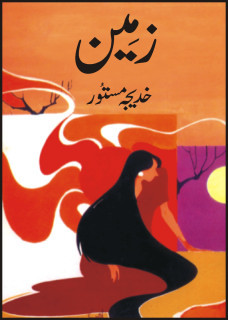
Muslim period in the Indian subcontinent (712–1757) is conventionally said to have started in 712, after the conquest of Sindh and Multan by the Umayyad Caliphate under the military command of Muhammad ibn al-Qasim. It began in the Indian subcontinent in the course of a gradual conquest. The perfunctory rule by the Ghaznavids in Punjab was followed by Ghurids, and Sultan Muhammad of Ghor is generally credited with laying the foundation of Muslim rule in Northern India.

The Delhi Sultanate or the Sultanate of Delhi was a late medieval empire primarily based in Delhi that stretched over large parts of the Indian subcontinent, for 320 years (1206–1526). Following the invasion of South Asia by the Ghurid dynasty, five dynasties ruled over the Delhi Sultanate sequentially: the Mamluk dynasty (1206–1290), the Khalji dynasty (1290–1320), the Tughlaq dynasty (1320–1414), the Sayyid dynasty (1414–1451), and the Lodi dynasty (1451–1526). It covered large swaths of territory in modern-day India, Pakistan, and Bangladesh as well as some parts of southern Nepal.

Muhammad bin Tughluq, also named Jauna Khan as Crown Prince, also known by his epithets, The Eccentric Prince, or The Mad Sultan, or The Wisest Fool was the eighteenth Sultan of Delhi. He reigned from February 1325 until his death in 1351. The sultan was the eldest son of Ghiyath al-Din Tughluq, founder of the Tughlaq dynasty. In 1321, the young Muhammad was sent by his father to the Deccan Plateau to fight a military campaign against the Kakatiya dynasty. In 1323, the future sultan successfully laid siege upon the Kakatiya capital in Warangal. This victory over King Prataparudra ended the Kakatiya dynasty.

The Tughlaq dynasty was the third dynasty to rule over the Delhi sultanate in medieval India. Its reign started in 1320 in Delhi when Ghazi Malik assumed the throne under the title of Ghiyath al-Din Tughluq. The dynasty ended in 1413.

Hazrat Nizamuddin Dargah is the dargah (mausoleum) of the Sufi saint Khwaja Nizamuddin Auliya. Situated in the Nizamuddin West area of Delhi, the dargah is visited by thousands of pilgrims every week. The site is also known for its evening qawwali devotional music sessions.

Devdutt Pattanaik is a mythologist and writer from Mumbai, India. He is also a speaker, illustrator and author, on Hindu sacred lore, legends, folklore, fables and parables. His work focuses largely on the areas of religion, mythology, and management. He has written books on the relevance of sacred stories, symbols and rituals in modern times; his more popular books include Myth = Mithya: A Handbook of Hindu MythologyJaya: An Illustrated Retelling of the Mahabharata and Sita: An Illustrated Retelling of the Ramayana and My Gita. Pattanaik has incorporated the Mahabharata and the Ramayana into human resource management.
Siddhartha Sarma is an Indian novelist and journalist from Assam who writes in English.

Mah Laqa Bai, born Chanda Bai, and sometimes referred to as Mah Laqa Chanda, was an Indian 18th century Urdu poet, courtesan(tawaif) and philanthropist based in Hyderabad. In 1824, she became the first female poet to have a diwan of her work, a compilation of Urdu Ghazals named Gulzar-e-Mahlaqa, published posthumously. She lived in a period when Dakhini was making its transition into the highly Persianized Urdu. Her literary contributions provide insight into such linguistic transformations in southern India.

Ira Trivedi is an Indian author, columnist, and yoga teacher. She writes both fiction and nonfiction, often on issues related to women and gender in India. Her works include India in Love: Marriage and Sexuality in the 21st Century, What Would You Do to Save the World?, The Great Indian Love Story, and There's No Love on Wall Street.

The Ekkos Clan is a mystery novel written by Indian author Sudipto Das, based on historical research. It was published by Niyogi Books and released in India in July 2013 and officially launched at a function in Bangalore on 3 August 2013.

Nandini Bajpai is a Boston-based author of Indian origin. Her debut young adult novel "Red Turban White Horse: My sister's hurricane wedding" was published by Scholastic India in 2013. Bajpai's book, Starcursed, a historical young adult novel, was published by Rupa Publications in November 2013. Her book Rishi and the Karmic Cat is middle grade was published by Rupa Publications in September 2015. In November 2017 Nikki Garcia at Little, Brown bought Nandini Bajpai's contemporary YA novel A Match Made in Mehendi for publication in spring 2019. A Match Made in Mehendi was released in September 2019 and received good industry reviews including a starred review from Publishers Weekly. Her young adult novel Sister of the Bollywood Bride was acquired by Little Brown/Poppy for a summer 2021 release.

Why I Am a Hindu is a 2018 book by Indian politician Shashi Tharoor. In the book, Tharoor writes about the history of Hinduism and its core tenets, as well as socio-cultural developments in India that relate to the religion, while elucidating his own religious convictions.

Anuja Chandramouli is an Indian author of fantasy and historical fiction.
Harsha Venilal Dehejia is an Indo-Canadian allergologist, author, and radio host, and Professor of Indian Studies at Carleton University. He was the winner of the 2003 Raja Rao Award for Literature for outstanding contributions to the literature and culture of the South Asian Diaspora, and the host of the radio show An Indian Morning for over 40 years.
Dalit music or Bahujan music is music created, produced, or inspired by Bahujans and Dalits, people often discriminated against on the basis of caste, including Dalit rock, Bhim rap and Dalit pop as well as the music genres of the Ravidasis, including Chamar pop, Bhim Palana, Bhim geet and Punjabi Ambedkarite music.
Jaya Misra is an Indian writer, creative director and producer in television, films, web series and documentaries.

Zameen, alternatively spelled Zamin, is an Urdu novel by Pakistani novelist and short story writer Khadija Mastoor. The novel was published posthumously by Idara-e-Farogh-e-Urdu in 1983. Daisy Rockwell, PhD, translated it into English and released it in July 2019 under the title A Promised Land. Zameen depicts the economic and political upheaval that entailed the partition of British India. It begins at the final setting of Mastoor's first novel Aangan – the Walton refugee camp in Lahore. Consequently, it is sometimes considered an extension of Aangan, however, Rockwell has clarified that it is not a narrative sequel, rather a philosophical and thematic follow-up. It is considered a political allegory and a women-centric historical account of Pakistan's independence.

I Have Become the Tide is a novel by Githa Hariharan published in 2019 by Simon & Schuster India. It is her sixth novel, and the third to focus on contemporary India. The book was first published in English, and a Malayalam translation was published in 2020 by Mathrubhumi Books.
Muhammad bin Tughluq was the eighteenth sultan of the Delhi Sultanate.
Rana Safvi is an Indian columnist, writer, and historian based in Delhi. She is the author of ten books including In Search of the Divine and The Forgotten Cities of Delhi. She writes for the Scroll.in, DailyO, ThePrint, Indian Express, Mint, The Wire, Business Line, The Quint, Outlook, NewsClick, Economic and Political Weekly, National Herald, News18, Naya Daur, TRT World, and The Hindu. A question related to her book was asked in Kaun Banega Crorepati.














